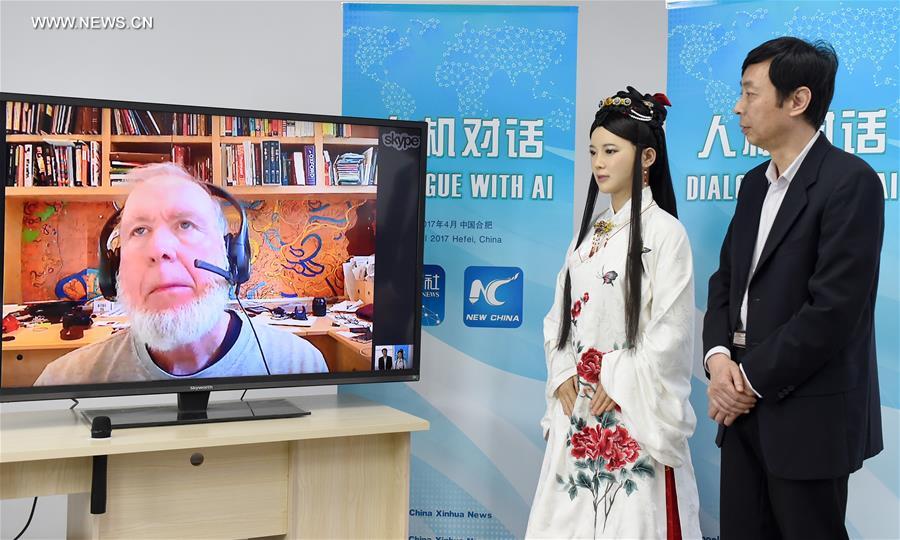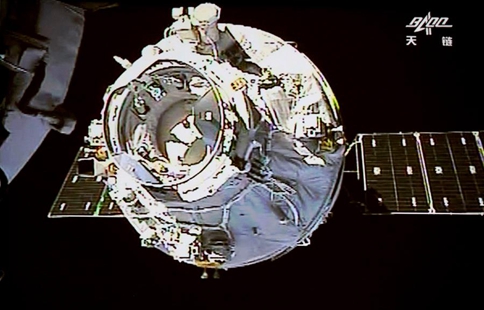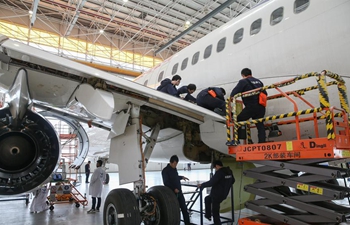
Chen Xiaoping (R), director of a robot research and development team, and Jia Jia, an interactive robot that looks like a real Chinese young woman in traditional outfit, talk through internet with Kevin Kelly on screen, founding executive editor of Wired magazine, in Hefei, capital of east China's Anhui Province, April 24, 2017. Jia Jia was invited as a special reporter of the Xinhua News Agency to conduct the man-machine dialogue with Kelly on Monday. Jia Jia was unveiled in 2016 by Chen's robot research and development team at the University of Science and Technology of China in Hefei. It took the team three years to research and develop this new-generation interactive robot, which can speak, show micro-expressions, move its lips, and move its body. (Xinhua/Guo Chen)
HEFEI, April 25 (Xinhua) -- The Xinhua News Agency recently added a new member to its team, and he or she isn't human.
Meet Jia Jia, a special Xinhua reporter who carried out an interview on -- who else -- global AI experts and science and technology tycons.
"It's something we could never have imagined," said Jia Jia's creator Professor Chen Xiaoping, director of the Robotics Laboratory at the University of Science and Technology of China (USTC) in Hefei, a city in east China's Anhui Province.
"Many unpredictabilities during the dialouge in the interview were also a challenge to us."
The first interview conducted by Jia Jia as a special Xinhua reporter on Monday was merely a small step in the era of artificial intelligence (AI), said Chen, who has been long involved in the development of Jia Jia and honored as the "father" of the robot.
Jia Jia, did a live interview with Kevin Kelly, a U.S. journalist and technology observer, on Monday, which was hailed by scientists as "having symbolic significance" as it was the world's first interactive conversation between an "AI reporter" and a human being.
Besides Kelly, Jia Jia also had interactive conversations on Monday with several computer experts and media representatives, including Bart Selman, Professor of Computer Science Department of Cornell University.
"Jia Jia is currently third generation, Jia Jia 3.5 is coming soon, and Jia Jia 4.0 and Jia Jia 5.0 will be even better," Chen said.
Compared with Jia Jia 1.0 and Jia Jia 2.0, Jia Jia 3.0 has expressions, and can identify a human being's language and countenance, the most significant improvement which makes her more attractive and more cordial in interactive conversations, said the head developer.
Despite the improvements in her software system, Jia Jia still carries many unpredictabilities in dialogue in English, Chen admitted.
Meanwhile, Chen said AI and robots will be universal and permeable in the future, bringing more convenience.
The professor said that the "Kejia" series of robots they developed is designed to provide family services, and the robots could change people's lifestyles once available on the market.
The need to task robots with more physical labor has never ceased, Chen said, adding humans should begin to consider what's next once robots take over their jobs.
The professor also noted that the research on robots in the past were heavily focused on brains, but for Jia Jia, scientists must tap both brain and heart, and Chen called the shift to include emotions challenging.
"You know she is a robot, but you also feel she is very much like a human being," he said.
"This feeling is very good, very wonderful."















